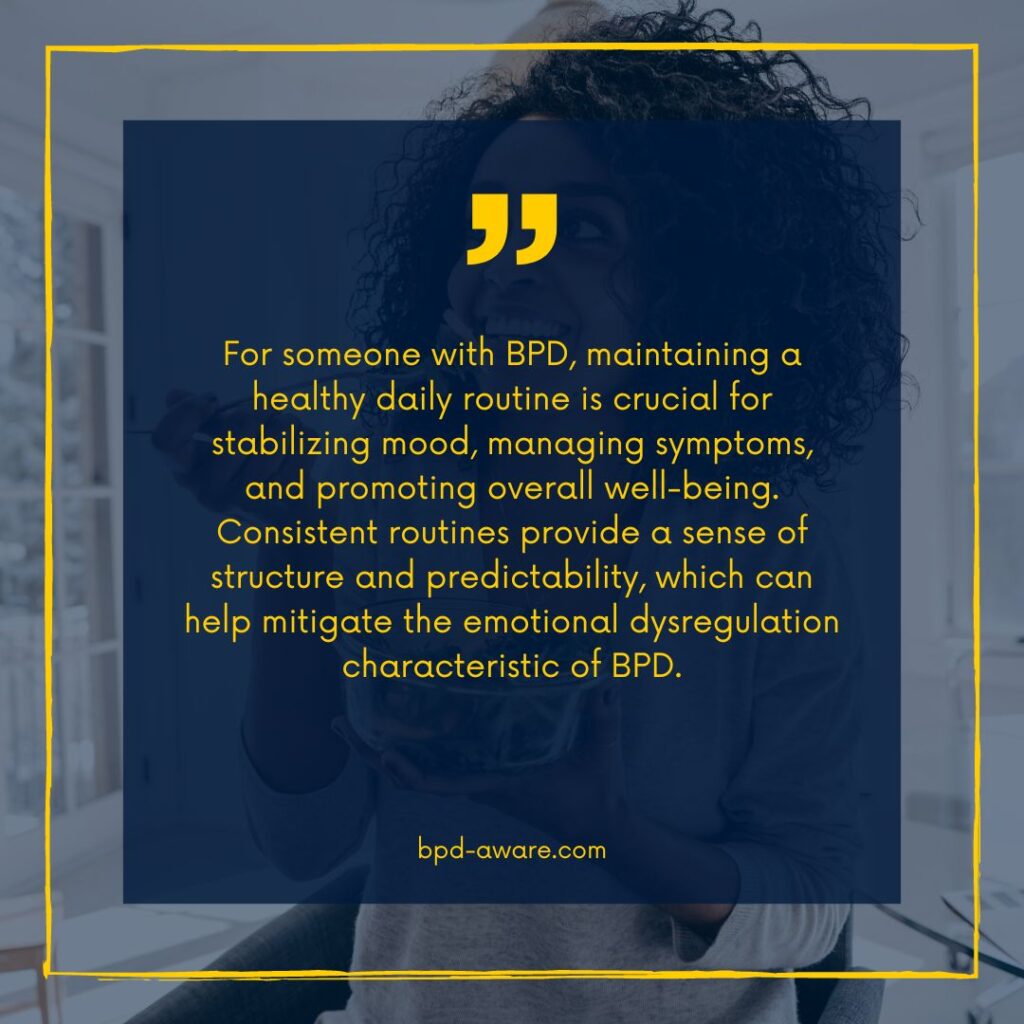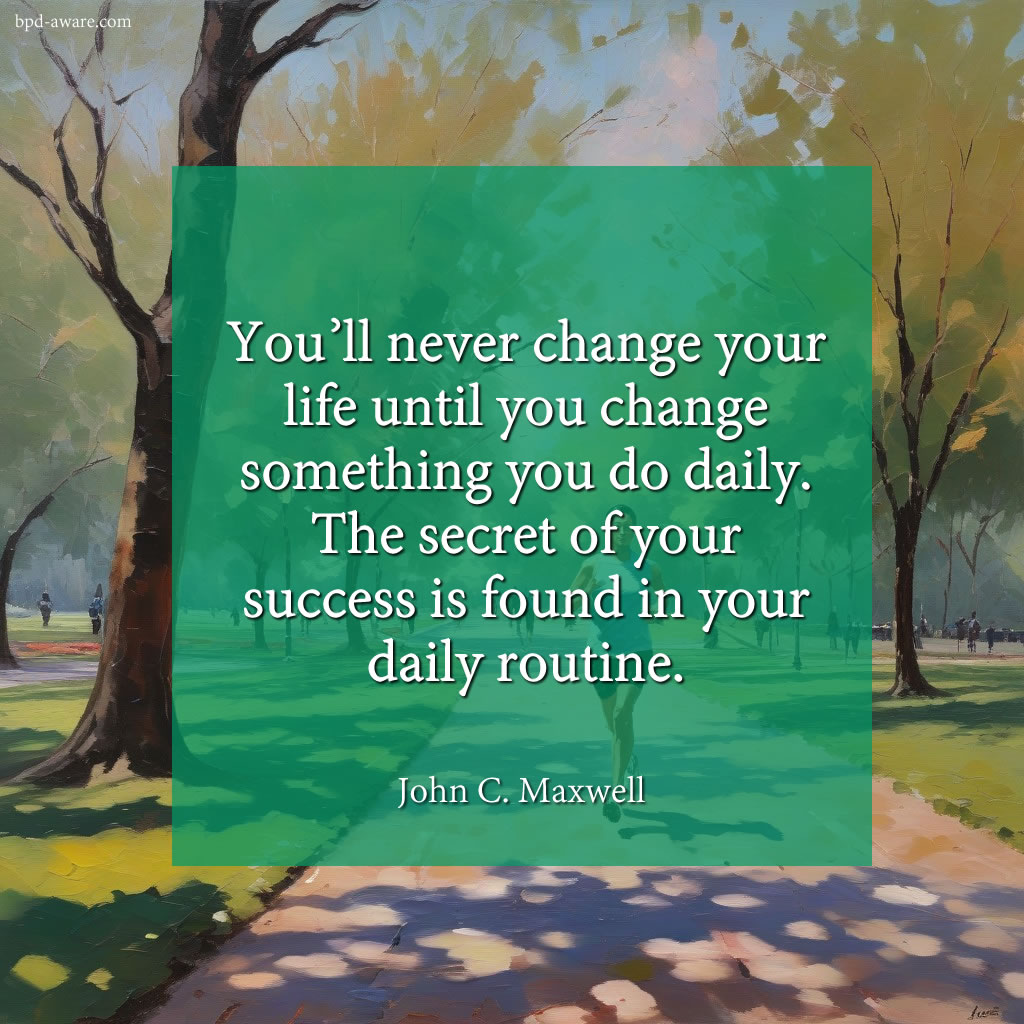When you live with Borderline Personality Disorder (BPD), it’s vital to create a healthy daily routine. A well-balanced daily routine helps to provide some stability and discipline in your life, something which can help a great deal with the up-and-down nature of living with BPD.
This article delves into the nature of a well-crafted daily schedule, exploring how it serves as a vital tool for mental, physical, and emotional health.
Establishing a healthy routine is more than just a series of tasks; it’s about creating a rhythm that aligns with our body’s natural cycles, caters to our personal goals, and respects our limitations. It’s a delicate balance between discipline and flexibility, ensuring that each day is not just about ticking off to-do lists, but about nurturing a holistic sense of well-being. From the moment we wake up to the time we lay our heads down to rest, each activity can contribute significantly to our overall quality of life.
Whether it’s the serenity found in morning meditation, the energy boost from a midday workout, or the tranquility of an evening ritual, a well-structured routine can be a big help in managing stress, enhancing productivity, and fostering a deeper sense of happiness and satisfaction. In the following sections, we’ll explore the science-backed benefits of a healthy routine, offer practical tips for creating one, and share insights on how to adapt these practices to the complexities of modern living. Read on as we reveal the profound impact that a simple daily routine can have on our lives, empowering us to live each day with purpose, clarity, and joy.
Creating a healthy daily routine for someone with Borderline Personality Disorder involves establishing structure and consistency while incorporating activities that promote emotional regulation, physical well-being, and mental health. Here’s an example of what a healthy daily routine could look like for someone with BPD:
Morning
- Wake Up at a Consistent Time: Start the day at the same time each morning to establish a sense of normalcy and predictability. This means even waking up at the same time on the weekends. Waking up at a consistent time is important to establishing a healthy sleeping pattern.
- Mindful Breathing or Meditation: Spend 10-15 minutes practicing mindfulness or meditation to ground yourself and set the right tone for the rest of your day. This can be done while still in bed or you could even go outside into your yard and spend a little time meditating.
- Healthy Breakfast: Eat a balanced breakfast that includes protein, whole grains, and fruits or vegetables to fuel your body and mind. Try to avoid sugar as that can create a rollercoaster effect on your energy levels, which in turn will affect your mood. An example of a healthy breakfast would be a couple of eggs with cooked bell peppers and a glass of pomegranate juice. Tea or coffee is also fine to drink but try to avoid becoming overly reliant on it as it can trigger anxiety.
- Personal Hygiene Routine: Engage in a consistent morning hygiene routine, including showering, brushing teeth, and getting dressed, which can improve self-esteem and readiness for the day.
- Remember to Take Your Medication: If you have any medication you take – whether it’s for BPD or other health issues – remember to take it before you begin your day. Most medication is recommended to be taken in the morning but, if yours isn’t, be sure to take it at the appropriate time.

Midday
- Engage in Physical Activity: If you get an hour for your lunch break, it can be a great time to fit in a quick walk and partake in a little exercise. This can really help boost your mood and reduce stress, especially if you work in a sedentary job. If you don’t have time to go for a walk during lunch, consider waking up a little earlier to go for a walk or doing some form of physical activity in the evening.
- Balanced Lunch: Have a nutritious lunch to maintain energy levels throughout the day. Something like a chicken salad is ideal to provide you with the nutrition you need to blast through the rest of the day.
- Scheduled Work or Activities: Whether it’s work, school, or planned activities, engage in structured tasks that provide a sense of accomplishment. If you don’t have anything planned for the day then consider it leisure time.
- Mindfulness Breaks: Take short breaks to practice mindfulness or deep breathing, especially when feeling overwhelmed or emotionally volatile. This can be as simple as closing your eyes for a moment and focusing on your breathing. Deep, steady breathing will help you to feel more calm.
Evening
- Reflect on the Day: Spend some time journaling or reflecting on the day’s events and your responses to them. This can help you to better understand your patterns (whether positive or negative) and triggers. You can read more about keeping a journal to track your life with BPD here.
- Set Your Goals For Tomorrow: With the day behind you in mind, write out a list of tasks, chores, and jobs that you want to get done tomorrow and cross them off as you accomplish them the next day. Lists help build discipline and keep your mind focused.
- Healthy Dinner: Consume a well-balanced dinner to nourish your body. If you have been consuming caffeine throughout the day, it’s time to switch to non-caffeinated beverages so that the caffeine doesn’t affect your sleep.
- Leisure Time: Engage in hobbies that you enjoy, such as reading, listening to music, or whatever else you’re into. This time is crucial for mental relaxation, physical health, and joy.
- Connect with People: Spend time with friends or family, or participate in a support group. Social connections are vital for emotional support.
Before Bed
- Wind-Down Routine: Engage in calming activities, like reading or listening to soothing music, to prepare your body and mind for sleep.
- Limit Screen Time: Reduce exposure to screens at least an hour before bed, as the blue light they emit and stimulation they provide disrupts sleep patterns.
- Go to Bed at a Consistent Time: Aim for a regular bedtime to regulate your sleep cycle, which is crucial for overall health. Most people need between seven and eight hours of sleep to function at their best.

Note on Flexibility: While consistency is key, it’s also important to be flexible. Some days might require adjustments to the routine, and that’s okay. There are external elements to life that we simply can’t control, as well as internal ones when you have BPD which makes life difficult. The goal is to create a framework that provides stability but also accommodates the realities of day-to-day life with BPD.
Not every day needs to look the same, especially your leisure time. One day you might choose to read while having a long soak in the bath, the next go out and visit family or friends, then the next day go for a run. It’s important to give yourself a wide selection of interests to choose from to prevent boredom and keep yourself growing in all aspects of life.
If you do deviate from your healthy daily routine for whatever reason, try not to be too hard on yourself. There’s always tomorrow to get things back on the right track.
Final Thoughts
Creating a well-structured daily routine for yourself can make a massive difference to your mental and emotional wellness. The importance of proper sleep, healthy eating, and regular exercise cannot be overstated. Neither can taking the time to relax, unwind, and engage in mindful behavior.
It’s not easy for everyone to just slip into a healthy routine. It requires effort and accountability. With dedication though, the healthy daily routine becomes just that – a routine; something that you find yourself engaging in every day.
That effort will eventually pay off and you’ll find yourself feeling more stable, better able to regulate your emotions, and happier as a result.
Sources, Resources, and Further Reading
- Routine Reset: Daily Habits for Good Mental Health: https://www.psychologytoday.com/us/blog/conquering-codependency/202312/routine-reset-daily-habits-for-good-mental-health
- Why Are Routines Important for Mental Health?: https://wholebodypsych.com/blog/building-a-routine-for-mental-health/
- How important is routine/order for a borderline individual?: https://www.reddit.com/r/BPD/comments/6bqmfp/how_important_is_routineorder_for_a_borderline/
- 8 Daily Habits to Boost Mental Health — and Signs It May Be Time to Get Support: https://www.healthline.com/health/mental-health/habits-to-improve-mental-health

















I definitely need more structure in my life. I’m going to start following this plan and see if it helps.
Feel free to adapt it and experiment with the routine. It’s more of a loose guideline than a rigid plan of action.
Let us know how it goes!
It’s been over a week and I’ve been consistent following my routine with the exception of one day where things fell apart. I was able to focus and get back on track the next day though, which was a big win for me.
I’ve found that keeping a routine has helped to provide a little more stability, both mentally and in my life in general. It’s not been a MASSIVE improvement yet but there’s definitely been a positive change. I’m going to keep up with it and would recommend it for others.